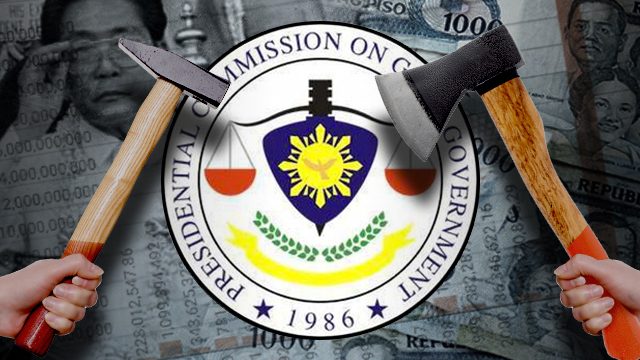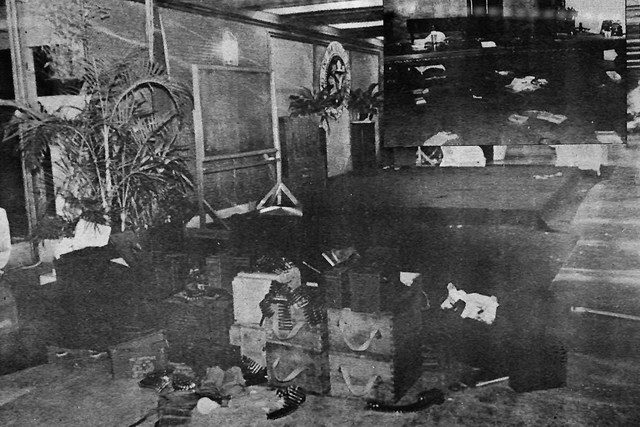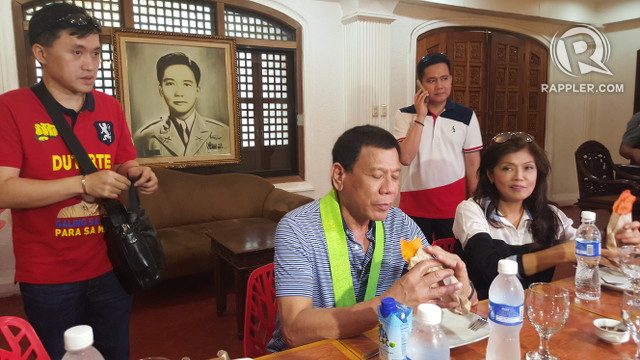SUMMARY
This is AI generated summarization, which may have errors. For context, always refer to the full article.

MANILA, Philippines – The recently announced plan of the Duterte administration to abolish the Presidential Commission on Good Government (PCGG) is nothing new.
Government officials under previous administrations initiated legislations and voiced their support to end the 3-decade run of the PCGG, citing its ineffectiveness and redundancy.
The PCGG was created through Executive Order No. 1, the first official act of former president Corazon Aquino after the 1986 People Power Revolution. It was tasked to recover the ill-gotten wealth of the late dictator Ferdinand Marcos, his family, and his cronies.
Latest available data from the PCGG shows that it has so far recovered P170 billion ($3.4 billion) since 1986. It still needs to recover more than half of the estimated $10 billion plundered during the Marcos regime that spanned more than 20 years. (READ: At 30: PCGG by the numbers)
The delays have been attributed to the “slow grind of the justice system, coupled by dilatory tactics employed by the defendants.”
Still, the PCGG has been severely criticized in the past for taking too long to fulfil its mandate, leading to some questioning its relevance and whether or not it still ought to exist. (READ: Recovering Marcos’ ill-gotten wealth: After 30 years, what?)
‘Justice delayed, justice denied’ under Estrada gov’t
The first move to abolish the PCGG came in 1998 when then president Joseph Ejercito Estrada called on Congress to pass a law to abolish the PCGG and just transfer the cases to the Department of Justice (DOJ).
This was after he emphasized during his 1998 State of the Nation Address (SONA) his disappointment over the delay in the wealth recovery.
“These cases have gone on long enough. Therefore, I order the Presidential Commission on Good Government to go forward on all ill-gotten wealth cases with all the evidence it has taken 12 long years to collect. No more delays,” he said.
“Pagkatapos ng 12 taon, siguro naman may katibayan na upang mabigyan ng katarungan ang sambayanang Pilipino. Ito ang maliwanag na halimbawa ng justice delayed, justice denied,” he added.
(After 12 years, I’m sure there is enough evidence to give justice to Filipinos. This is a clear example of justice delayed, justice denied.)
It was also the same year when then senator Aquilino “Nene” Pimentel Jr filed a bill seeking to abolish the PCGG. The bill did not prosper.
In 2001, then senator Sergio Osmeña revived this issue stating that the PCGG only breeds corruption and has produced little achievements in its then 15-year existence.
A Newsbreak report in 2002 quoted Osmeña as saying that it is “better to simplify matters and hand the work over to the DOJ.”

Difference between Congress and Arroyo
Osmeña once again spearheaded the talks on the abolition of the PCGG.
During the 13th Congress in 2004, he filed Senate Bill No. 332, saying that the “vast discretionary powers vested in the PCGG constitute dangerous opportunities for misuse of power and authority.”
In fact, former PCGG chief Camilio Sabio was sentenced to 12 to 20 years in prison for graft last January 2017 stemming from anomalous vehicle leases in 2007 and 2009 when he headed the commission.
Two years after Osmeña’s bill, Pimentel tried again and filed Senate Bill No. 292 during the 14th Congress in 2006. In the explanatory note, he said that the PCGG “has not produced significant accomplishments that would justify its continued existence.”
The two bills filed during the Arroyo administration, which sought to transfer the responsibilities of the PCGG to the DOJ, did not prosper and was stuck at the committee-level.
Despite the criticism on the ground, the presidency then did not support the abolition, saying that “there is no reason for it to be dismantled because we continue to receive reports from the PCGG about what they are doing to accomplish their mission.”
But in July 2007, then president Gloria Macapagal Arroyo, through Executive Order 643, placed the PCGG under the administrative supervision of the DOJ from the Office of the President.
This move was to fulfill “the need to concentrate and enhance the full and effective recovery of the ill-gotten wealth and properties, including the investigation and prosecution of cases.”
PCGG chair wanted to end own commission under Aquino administration
While former PCGG heads defended the relevance of their commission, it was a different case during the administration of Benigno Aquino III.
In 2011, then PCGG and now Commission on Elections Chairperson Andres Bautista, in a letter sent to Aquino, gave his team two years to finish all tasks and “the transfers and ‘winding down’ efforts” to other agencies before it is abolished.
This move was backed by then justice secretary Leila de Lima.
The proposal, however, did not materialize. In 2013, Bautista again recommended the abolition of the PCGG since it has became too costly for the government.
Meanwhile, only one bill was filed in the Congress that sought to support the proposal in 2013. It was referred to another committee but did not prosper.

Revival of plans under Duterte
Budget Secretary Benjamin Diokno, on Wednesday, July 26, said that the possible dissolution can happen with the passage of “Rightsizing the National Government Act of 2017” under the Duterte administration.
Despite the stealthy burial of the late dictator at the Libingan ng mga Bayani happening just less than a year ago – following a controversy that went all the way to the Supreme Court – Malacañang maintained there is “no politics” in the decision.
It was not a secret, however, that the allies of Duterte really planned to change things at the PCGG.
As early as March 2017, House Speaker Pantaleon Alvarez filed a bill expanding the function of the Office of the Solicitor General to include the responsibilities of the PCGG.
This means that all the powers and responsibilities of recovering the ill-gotten wealth will go to Solicitor General Jose Calida, a Marcos supporter. It was cause for concern among advocates.
In fact, Calida was among the leaders of the Alyansang Duterte-Bongbong which campaigned for the tandem of Duterte and Ferdinand Marcos Jr during the 2016 elections. (READ: In charge of recovering ill-gotten wealth? But Calida is pro-Marcos)
In March 2017, however, he told reporters that his leanings during the campaign season will not affect his work.
Diokno, on Wednesday, also said that the commission doesn’t do anything, adding that employees enjoy so much because of their perks.
In a Facebook post on its official page, the PCGG hit back, adding that it was “surprised at the recent questions regarding its performance, relevance, and efficiency.”
The issue surrounding the future of the PCGG, however, should not hinder ongoing efforts – especially since there is still more than $5 billion in ill-gotten wealth yet to be recovered and pending cases before the Sandiganbayan. – Rappler.com
Add a comment
How does this make you feel?
There are no comments yet. Add your comment to start the conversation.